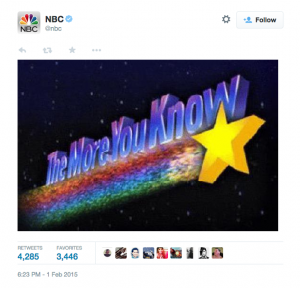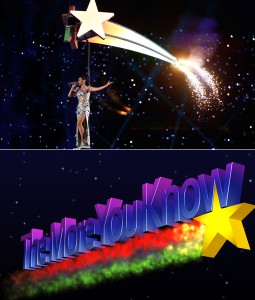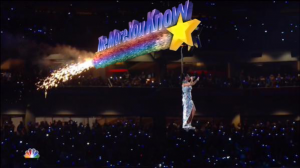The More You Know About Cross-Promotion
I have a confession to make: I did not watch the Super Bowl. But that didn’t keep me from knowing exactly what happened: the crazy last few minutes of the game, the best and worst of the commercials, and (of course) Katy Perry’s halftime show.
Imagine my delight when a friend & colleague posted a note to my Facebook wall alerting me to the fact that Katy Perry had appeared under what looked to be a replica of the classic “The More You Know” star, made famous in the NBC PSAs of our youth.
Below is an example, a 1990 Will Smith PSA on the benefits of staying in school.
And here is Katy Perry performing “Firework” during Sunday’s Super Bowl halftime show:
And, because the internet is awesome, here’s a side-by-side comparison…
…and a mash-up:
As a scholar of media conglomerates and the logics that govern their operations, I have found the entire event immensely fun. The question I got peppered with (well, if you count three friends’ comments as “peppering”) had to do with whether or not I thought Perry’s production was an example of planned cross-promotion, as the Super Bowl aired on NBC this year.
 The short answer is that I don’t know. I do know NBC was very quick to take advantage of the situation, tweeting out the “More You Know” logo at 7:23pm Eastern–a tweet that has been retweeted over 4000 times, typically with comments like “Nicely played, NBC!” That tweet alone helped people make the connection between Perry’s performance, the PSA series, and NBC. Although many people of a certain age are likely to remember the PSAs, it’s quite likely that they would not remember them to be an NBC product. NBC’s quick thinking (or advance knowledge and planning, perhaps) aided in closing the loop to take full advantage of the cross-promotional opportunity.
The short answer is that I don’t know. I do know NBC was very quick to take advantage of the situation, tweeting out the “More You Know” logo at 7:23pm Eastern–a tweet that has been retweeted over 4000 times, typically with comments like “Nicely played, NBC!” That tweet alone helped people make the connection between Perry’s performance, the PSA series, and NBC. Although many people of a certain age are likely to remember the PSAs, it’s quite likely that they would not remember them to be an NBC product. NBC’s quick thinking (or advance knowledge and planning, perhaps) aided in closing the loop to take full advantage of the cross-promotional opportunity.
The long answer is that I don’t care, and you shouldn’t either—because NBC definitely doesn’t. I’ve been grinning about this all week, because it beautifully illustrates something crucial to understanding the nature of cross-promotion: it doesn’t matter if it’s pre-planned or not, and it works better when it doesn’t appear to be arranged.
Like all forms of product integration, where advertisements are embedded within content, cross-promotion works by appearing “natural” and “organic” to that content. When Jimmy Fallon has stars of NBC TV series on The Tonight Show, it’s an instance of cross-promotion, but it wouldn’t necessarily strike anyone as odd because Jimmy Fallon has lots of stars on The Tonight Show. The star’s appearance on Fallon offers a potential double win for NBC; the star may draw fans to The Tonight Show, and the appearance might draw Fallon fans to the star’s series. And that, of course, is the logic behind cross-promotion. The risk NBC takes in engineering these opportunities is that if the audience feels duped, or like the network is trying to trick them, they might be turned off—but that sort of reaction is highly unlikely if the cross-promotion is thoughtfully conducted and unobtrusive.
And therein lies the beauty of Katy Perry’s ride on the “The More You Know” star at Super Bowl XLIX: it appeared to just happen with no forethought. That sense of happenstance was a huge win for NBC, as audiences got to feel smart by noticing it, tweeting about it, commenting on Facebook, or saying something to their friends at the Super Bowl party. That reward coupled with an accompanying nostalgia for an era when NBC was enjoying the height of their must-see-TV glory days imbues the entire incident with a rosy glow for audiences and, in turn, for the network. Just as the appearance of an NBC star on Fallon offers a potential double win for NBC, so does a situation like this.
If it was pre-planned, it was an absolutely genius move made even better by no one from Perry’s camp or NBC stepping forward to claim credit for thinking of it. If it wasn’t pre-planned, NBC got really lucky with Perry generating nostalgia for a PSA campaign that they could link to their network. And whoever was manning the Twitter account on Sunday deserves a bonus.
I can hear the higher-ups at NBC now, gleefully counting up the many folks who ventured to YouTube to look up videos of 1990s PSAs, only to be flooded with warmth and affection for the bygone days of the network. “Oh man…remember when NBC had Friends? And ER? And Fresh Prince of Bel-Air?” NBC remembers, and they’re glad that now you do too. And it’s all because Katy Perry rode a star around a football stadium on national TV.





Yes! Appearing to be unplanned is key to the perception of authenticity!
Legacy media finally going with the viral flow these days.
Did you see Brian Steinberg on how standard product placement looks too inauthentic and how advertisers want more natural integration?
http://variety.com/2015/tv/news/tvs-old-product-placement-era-could-be-nearing-its-end-1201423710/
I’d missed that, Cynthia–thanks for pointing it out!